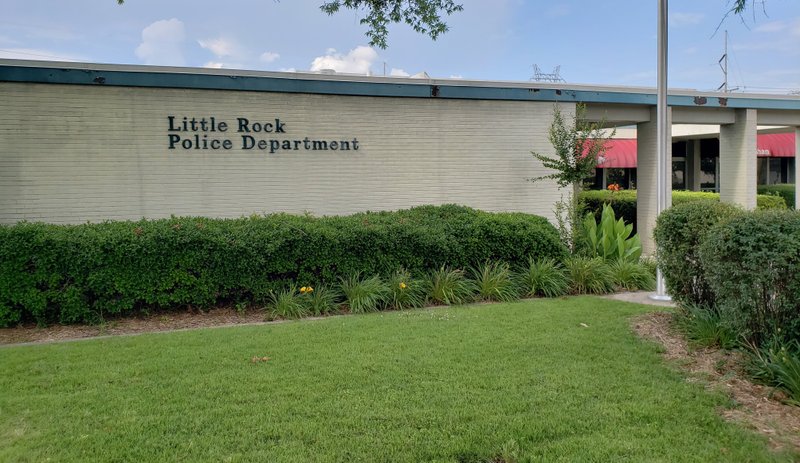The most recent critical-incident video of a police shooting, released by the Little Rock Police Department on May 13, was produced by Little Rock Television and department personnel, according to records and statements from officials, unlike an earlier critical-incident video production for which the city relied on a marketing firm tied to the mayor's chief spokeswoman.
The department released the video of the May 8 shooting online. The video package spliced together footage of the shooting and subsequent apprehension of a motorist after a driving-without-consent call.
[Video not showing up above? Click here to watch » https://www.youtube.com/watch?v=8HQu1vTlDKU]
The video was more than 19 minutes long and featured views of the incident from police body cameras, an introduction from a department spokesman and analysis of the encounter provided by Police Chief Keith Humphrey.
The decision to have city personnel produce the latest critical-incident video contrasted with the production of a 2019 video showing the fatal shooting of Bradley Blackshire, a 30-year-old Black motorist who was shot during an encounter with then-Little Rock police officer Charles Starks.
The public relations and marketing firm where Mayor Frank Scott Jr.'s chief spokeswoman and her husband are employed was paid nearly $5,000 to produce the video package showing Blackshire's shooting.
Mayoral spokeswoman Stephanie Jackson is a part-time employee of the city and simultaneously serves as director of public and media relations for The Design Group, a local marketing company. Her husband, Myron, also works at the firm.
Kendra Pruitt, senior adviser to Scott, said the city did not have the resources or capacity to produce the 2019 critical-incident video in-house. Scott was inaugurated in January 2019.
When asked whether it was a mistake to rely on an outside firm connected to Jackson in light of the fact that the most recent police video was produced in-house by city personnel, Pruitt said no.
"No, it was not a mistake to retain The Design Group to produce the 2019 critical incident video (CIV) related to Bradley Blackshire," Pruitt wrote in an email Friday. "In an effort to be accountable, clear, and transparent, we deemed it important to produce and release the State's first critical incident video that has become a benchmark for our Police Department and other municipalities."
In 2019, The Design Group's involvement with the video of the Blackshire shooting was attributed to the speed with which the firm would be able to turn around the video.
When questioned about the potential conflict, Scott told the Arkansas Democrat-Gazette at the time: "I did not see a conflict of interest, particularly in the weighing of community unrest and transparency. We could not afford to wait on releasing that video a 14th or 15th day."
The Design Group was paid $4,990. The size of the payment avoided the city's threshold in which purchases of more than $5,000 must go out for a competitive bid, though the rules say a waiver can be obtained for large purchases when they're in the city's best interest.
At the time, Scott suggested to the newspaper that a competitive bid might have increased the cost of the video production, alluding to a possible "rush job." The shooting took place Feb. 22, 2019. The video was released March 7, 13 days later.
Starks was terminated after the shooting, though he was later reinstated pursuant to a judge's order. He ultimately resigned from the department last fall.
The suspect in the May 8 encounter, 37-year-old Michael Smith, was shot in the leg and hospitalized. He was later charged with felony counts of criminal attempt to commit capital murder, fleeing police and second-degree battery as well as unauthorized use of a vehicle, a misdemeanor.
In an email, police spokesman Mark Edwards said that he,Sgt. Eric Barnes and Little Rock Television "were responsible for the video."
"We were not compensated anything extra," Edwards wrote.
When asked if The Design Group was compensated or involved with the production of the most recent police video, Jackson said no when reached via email May 18. She could not be reached for additional comment between May 21 and Friday.
A Freedom of Information Act request for records related to the May 13 video, including receipts and correspondence related to the video production, did not return any public records, according to the Police Department.
Earlier this year, The Design Group was credited with production work associated with the mayor's virtual State of the City broadcast, which took place March 25. However, Jackson said the firm was not compensated for that work.
When asked what changed between 2019 and 2021 to allow the city to forgo an outside firm for police-video production, Pruitt wrote in an email, "The City was able to learn from the standard set by the 2019 critical incident video, as it had not been done before in the City or State, and we have used that model to produce our own videos in-house since that time."
She added: "Since 2019, we have hired a part time videographer to work with LRTV, and LRPD has hired a civilian [public information officer] who also assisted with the most recent critical incident video. We will continue to do what is necessary to release quality, pertinent information in a timely manner in efforts to be accountable, clear, and transparent for our residents."
